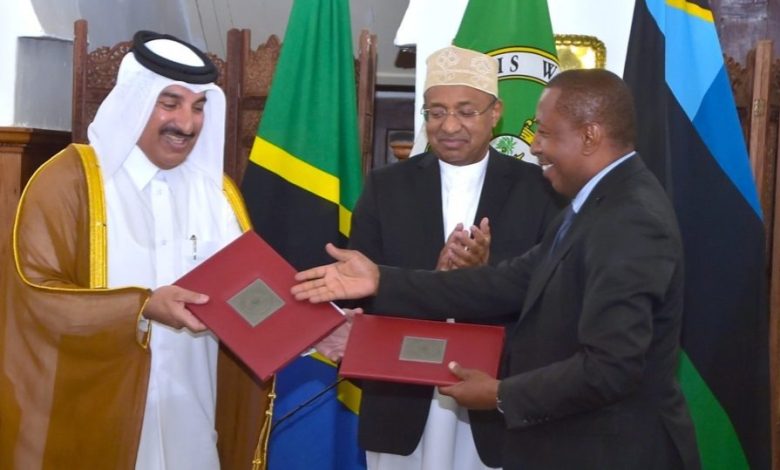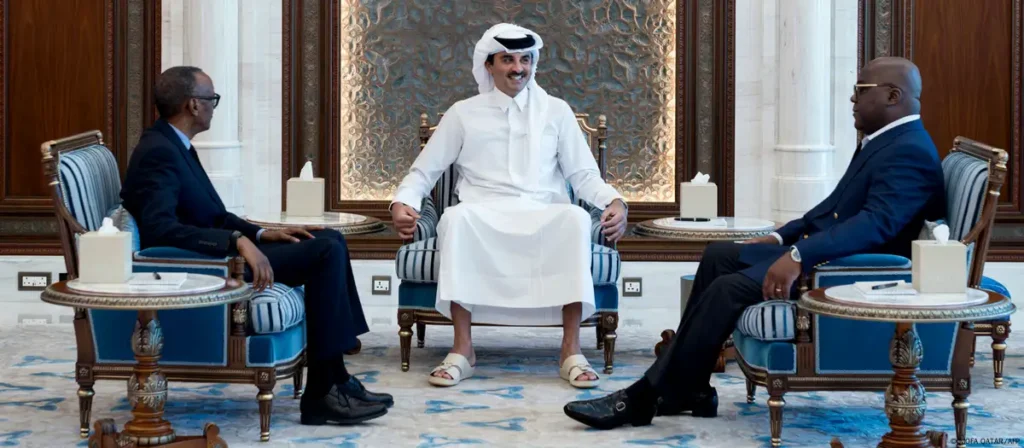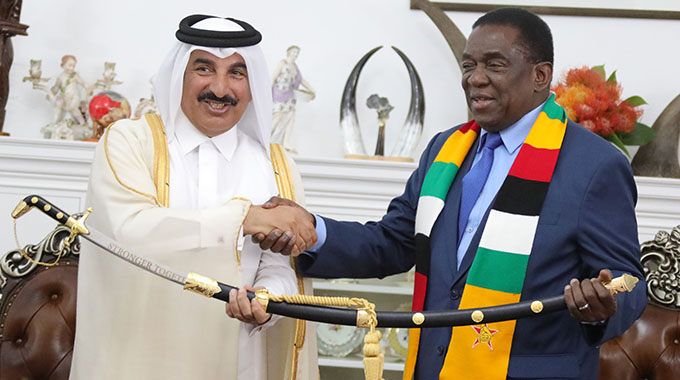Qatar’s growing reach in East Africa: Strategic Investments driving growth

The Qatar Zanzibar Deal
In a groundbreaking Friday at Zanzibar’s State House, President Hussein Mwinyi oversaw the signing of a Memorandum of Understanding (MoU) with Qatari investors whose investment value is estimated to be at $10bn (about 25tri/-). The deal was signed by the Permanent Secretary in the President’s Office (Labour, Economy and Investment) Khamis Mwalimu Suleiman and Sheikh Mohammed bin Mansour bin Jabor bin Jassim Al Thani, a member of Qatar’s royal family and the owner of the Al Mansour Holdings Africa, the investment company, involved in investing the billions on the continent.
Projects range across several zones that are essential to Zanzibar’s development, among them:
- Oil storage depots to boost the archipelago’s energy security.
- Port development to help boost trade and connectivity.
- Contemporary conference facilities to host regional and international events.
- Tourism projects conforming to Zanzibar’s international brand boasting status as one of the world’s principal tourism destinations.
- Blue Economy projects, such as fisheries and marine conservation.
- Investment in renewable energy to ensure climate sustainability.
President Mwinyi said the agreement was a milestone and that the government was ready to quickly embark on the implementation of the projects. He said that financial strength and commitment that Qatar has prove that Zanzibar’s long-term development vision would be realized very soon.
Also Read: Africa’s coffee finds a new frontier market across Gulf countries
Al Mansour Holdings $103 billion Pan-African commitment
Outside Zanzibar, Qatar’s investment drive has assumed a continental dimension. Al Mansour Holdings, one of Qatar’s biggest business conglomerates, recently announced that it would make a $103 billion investment across six African countries. Here are the : The distribution represents a strategic spread throughout Southern and Central Africa:
- Democratic Republic of Congo: $21bn
- Mozambique: $20 billion
- Zambia: $19 billion
- Zimbabwe: $19 billion
- Botswana: $12 billion
- Burundi: $12 billion
This selection proves Qatar’s long-time keen interest in the resource -rich and strategically located African countries. The emphasis goes from mining and electricity infrastructure to agriculture, and logistics, which will generate direct employment and regional trade integration.
Also Read: African leaders call for U.S. tariff reforms, investment-led ties
Why Qatar’s Investments in Africa Matters
With an Indian Ocean coastline and fast-growing economies, East Africa is a priority investment area for Gulf investors. Qatar’s investments in Zanzibar are especially symbolic in that they reinforce not only bilateral relations between Qatar and Zanzibar but also are a doorway to the wider East African market.
The region already receives huge investment from the UAE and Saudi Arabia, especially in ports, logistics and agriculture. Qatar’s initiative is evidence of its competitive spirit, and an attempt to match these strides through positioning itself to benefit from East Africa’s economic metamorphosis.
Fitting itself into Zanzibar’s Blue Economy plans, Qatar is placing itself in the most promising, sustainable sectors of the African economy. Investing in renewable energies and tourism also falls within the framework of regional development, allowing the combination of economic development with environmental conservation.
The Blue Economy as a Strategic Anchor
Zanzibar has relied for decades on its tourism, spices and fishing industry. But the Mwinyi government has emphasised a Blue Economy that ensures sustainable use of ocean resources for economic growth, livelihoods and ecosystem health.
Not only timely is Qatar’s investing here, but strategic too. Oil storage facilities and port development can support Zanzibar’s role as a maritime hub; renewable energy initiatives can supply energy both to urban areas and off-grid rural communities. Countries pour capital to transform fisheries into vibrant marine sectors. Marine investments will also enhance food security, increase export and tens of thousands jobs for Zanzibaris.
Local Benefits and Community Impact
Foreign direct investment at this scale doesn’t come without questions of the impact on communities. In Zanzibar, the impact could be life-changing:
- Employment generation: Direct and indirect employment will be created from infrastructure, tourism and energy projects.
- Skills Sharing: Qatari firms could collaborate with local firms to train young people in areas like renewable energy, hospitality, and logistics.
- Infrastructure: Hi-tech ports and conference halls will enhance the competitiveness of Zanzibar, thus attracting more business and international meetings.
- Tourism growth: With up-to-date facilities, Zanzibar could outcompete beach-only destinations and also become a regional center for both business and leisure travel.
At the same time, proper supervision will be required to ensure that projects do not forfeit their environmental sustainability and that benefits are fairly distributed among communities.

Challenges and Opportunities
While Qatar’s commitments are meaningful, execution is another matter. Africa is accustomed to big investment announcements that stall or never come to fruition. It will need careful planning, co-operation of Qatari investors, measures by local governments and authorities and, backing by the regulatory system.
Zanzibar may find its own set of obstacles, such as land acquisition wrangles, environmental issues and the necessity that local people actually participate in these high value projects. On a continental level, the speed and success of investments could also be influenced by political stability in countries such as the DRC and Zimbabwe.
Still, the possibilities far outweigh the dangers. The arrival of Qatar means not just money but credibility. Other Gulf investors might do the same, hastening East Africa’s participation in global trade and investment networks.
Strengthening Gulf–Africa Relations
Qatar’s expanding role in Africa follows a wider Gulf pattern. For Doha, the continent is an economic opportunity and a strategic partner in its global geopolitical interests. The Zanzibar MoU and the Al Mansour Holdings’ commitments suggest Qatar is interested not only in extracting resources but in developing diversified, long-term business partnerships.
“As President Mwinyi noted, this is only the beginning.” As the technical teams from each side begin to be deployed in their respective countries to implement the agreements, Zanzibar is poised for an influx of foreign direct investment that could revolutionize its infrastructure and the economy.
Outlook
The scope of Qatar’s involvement in Africa heralds new horizons in Gulf–Africa relations. “Oh, it grabbed Tanzanians by their hearts!” Hafidh said, “because it is about more than just an investment deal; it is about a vote of confidence in stability, resources, and future potential of the wider East Africa.”
When viewed alongside Qatar’s broader continental approach, the developments mean Doha is on course to becoming a major player in Africa’s economic transformation over the next few decades. If these projects are realized as conceived, Zanzibar could serve as a model for how Gulf–Africa partnerships can result in sustainable, equitable growth.
Share this content:





Post Comment